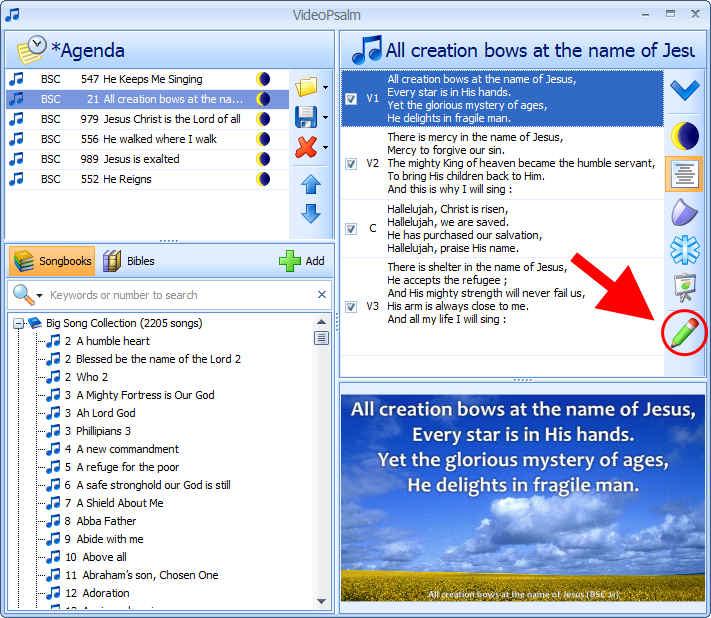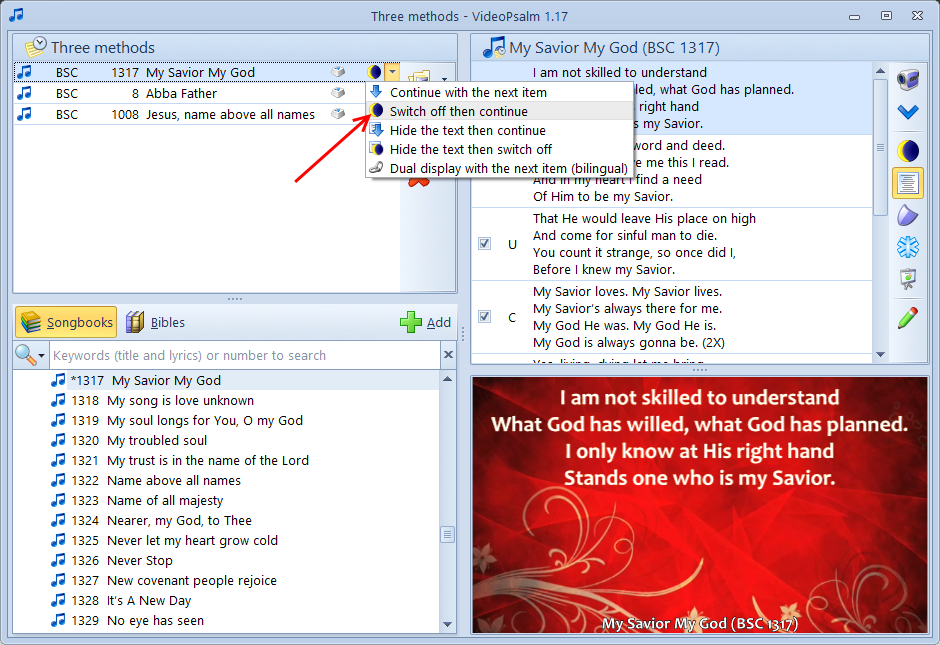Psalm 6 (New International Version)Psalm 6For the director of music. With stringed instruments. According to sheminith.aA psalm of David. 1O LORD, do not r. Learn about VideoPsalm. Read VideoPsalm reviews from real users, and view pricing and features of the Worship software.
You know there are 150 psalms, but did you know there are 8 different kinds of psalms in the great songbook?
You'll find them mentioned in those little bits of text at the beginning of most Psalms—the same area that tells us who wrote the psalm. (By the way, you can see a list of all the psalmists here.)
These lines are known as the Psalm titles, and sometimes they tell us what kind of Psalm we're reading. And just so you know, these aren't like the chapter headings you'll see in the rest of your Bibles—these are part of the ancient manuscripts.
So . . . if there are 8 different kinds of psalms in Psalms, what are they?
The 8 different kinds of Psalms in the Bible
Let's go through all 8 different kinds of psalms. Design software free. We'll look at who wrote them, which psalms fall into the different categories, and what the different categories mean.
Heads-up: scholars are still in the dark on what some of these psalm styles are, so some of these summaries won't be as hefty as others.
Another heads-up: like other pieces of music, not all psalms fall neatly into one category. Some psalms are spread out across several categories. And some Psalms aren't given any category in their titles.
(By the way, Logos Bible Software has a really cool Psalms Explorer tool that helped in putting this list together.)
1. Psalm
Psalmists: David, Asaph, Sons of Korah, Heman
Number: 57
(Psalm 3, 4, 5, 6, 8, 9, 12, 13, 15, 19, 20, 21, 22, 23, 24, 29, 30, 31, 38, 39, 40, 41, 47, 48, 49, 50, 51, 62, 63, 64, 65, 66, 67, 68, 73, 75, 76, 77, 79, 80, 82, 83, 84, 85, 87, 88, 92, 98, 100, 101, 108, 109, 110, 139, 140, 141, 143)
Description:
This is the biggest category of psalms, obviously. The Hebrew word for psalm, mizmôr, means 'melody.' You won't find this word anywhere else in the Bible—only in the titles of the Psalms.
You will, however, find that a few other psalm categories nested underneath the psalm umbrella, such as Maskils and songs.
When the Old Testament was translated into Greek (the Septuagint), the word psalmos was used for mizmôr. Psalmos means 'song for the harp,' or originally, 'plucking of strings.'
2. Psalms of praise
Psalmist: David
Number: 1
(Ps 146)

Description:
This song is derived from a Hebrew word for showing praise and appreciation. It's a song that recognizes the acts and character of God and responds appropriately: in worship.
Only one psalm is called a psalm of praise in the Bible, and that's Psalm 146. But get this: in the Hebrew Bible, the whole book is named 'psalms of praise.' So in this sense, all 150 could be grouped into this category.
Fun fact: You'll find another psalm of praise in your Bible. The Levites sing one on the field of battle, and the Lord fights for Judah, Jerusalem, and King Jehoshephat. The lyrics are simple:
Give thanks to the Lord,
For His lovingkindness is everlasting.
(2 Ch 20:21–22)
3. Song
Psalmist: David, Asaph, sons of Korah, Heman, Solomon
Number: 31
(Ps 18, 30, 45, 46, 48, 65, 66, 67, 68, 75, 76, 83, 87, 88, 92, 108, 120, 121, 122, 123, 124, 125, 126, 127, 128, 129, 130, 131, 132, 133, 134)

Description:
The word for 'song' in Hebrew is the noun form of 'sing,' so it's safe to say these kinds of psalms are meant to be sung. It's used more generally than 'psalm' in the Bible. These 'songs' are not always directed toward God. The Bible mentions songs from the Lord's priests (2 Ch 29:27), from birds (Zep 2:14), and even from prostitutes (Is 23:16).
There's a good amount of overlap between psalms and songs in this book. Thirteen pieces are labeled as both. Of course, that should be no surprise. Psalms are melodies, and songs are sung . . . it'd be easy to do both at the same time. ;-)

Description:
This song is derived from a Hebrew word for showing praise and appreciation. It's a song that recognizes the acts and character of God and responds appropriately: in worship.
Only one psalm is called a psalm of praise in the Bible, and that's Psalm 146. But get this: in the Hebrew Bible, the whole book is named 'psalms of praise.' So in this sense, all 150 could be grouped into this category.
Fun fact: You'll find another psalm of praise in your Bible. The Levites sing one on the field of battle, and the Lord fights for Judah, Jerusalem, and King Jehoshephat. The lyrics are simple:
Give thanks to the Lord,
For His lovingkindness is everlasting.
(2 Ch 20:21–22)
3. Song
Psalmist: David, Asaph, sons of Korah, Heman, Solomon
Number: 31
(Ps 18, 30, 45, 46, 48, 65, 66, 67, 68, 75, 76, 83, 87, 88, 92, 108, 120, 121, 122, 123, 124, 125, 126, 127, 128, 129, 130, 131, 132, 133, 134)
Description:
The word for 'song' in Hebrew is the noun form of 'sing,' so it's safe to say these kinds of psalms are meant to be sung. It's used more generally than 'psalm' in the Bible. These 'songs' are not always directed toward God. The Bible mentions songs from the Lord's priests (2 Ch 29:27), from birds (Zep 2:14), and even from prostitutes (Is 23:16).
There's a good amount of overlap between psalms and songs in this book. Thirteen pieces are labeled as both. Of course, that should be no surprise. Psalms are melodies, and songs are sung . . . it'd be easy to do both at the same time. ;-)
Fun fact: You'll find thirty-one fine songs in the book of Psalms, but don't forget the song of songs, which is Solomon's (So 1:1).
4. Maskil
Psalmist: David, Asaph, sons of Korah, Heman, Ethan
Number: 12
(Ps 32, 42, 44, 45, 52, 53, 54, 55, 74, 78, 88, 89, 142)
Description:
No idea what this kind of psalm is. It could refer to a kind of wisdom poem or music genre, but we don't know. The word only shows up in the book of Psalms, and only appears outside the psalm titles once (Ps 47:7). My NASB translates it 'skillful psalm,' and the KJV translates it 'understanding.' The ESV just calls it a 'psalm.'
But we know this much: a piece can be a Maskil, a psalm, and a song all at once (Ps 88). It can also double as a prayer (Ps 142), which brings us to the next category.
5. Prayer
Psalmists: David, Moses
Number: 4
(Ps 86, 90, 102, 142)
Description:
This kind of psalm is just what it sounds like: a direct plea or request to the Lord.
6. Mikhtam
Psalmist: David
Number: 6
(Ps 16, 56, 57, 58, 59, 60)
Batch file for command. Description:
This kind of psalm is a mystery. However, five of the six Mikhtam poems have musical recommendations, and four of them are connected to specific events in David's life.
7. Shiggaion
Psalmist: David
Number: 1
(Ps 7)
Description:
We get this word from the Hebrew word for reeling, or going astray. This might mean this is a 'wild, passionate song,' according to the Enhanced Brown-Driver-Briggs Hebrew and English Lexicon. Openbve jr ou main lineopenbve data publishing studio 2013.
Fun fact:
Video Psalms Download
There's only one Shiggaion in the Psalms, but there are two in the Bible as a whole. The last chapter of Habakkuk is a Shiggaion as well (Hab 3:1).
8. Song of Ascents
Known psalmists: David, Solomon
Number: 15
(Ps 120, 121, 122, 123, 124, 125, 126, 127, 128, 129, 130, 131, 132, 133, 134)
Youtube Videos Psalms
Description:
A special subset of songs. The word for 'Ascents' refers to a pilgrimage upward—to the city of Jerusalem. The Law required Jews to make their way to the temple for certain festivals every year. These songs may have been a means of preparing the travelers' hearts for worship—and we all know a good song can help pass the time on a long road trip.
All the Songs of Ascent are grouped together: Psalms 120–134.
Related resources:
- More about the book of Psalms
- Other songs based on the Psalms
Explore the Bible with us!
We create research-based articles and handy infographics to help people understand the Bible.
Join our email list, and we'll send you some of our best free resources—plus we'll tell you whenever we make something new.
